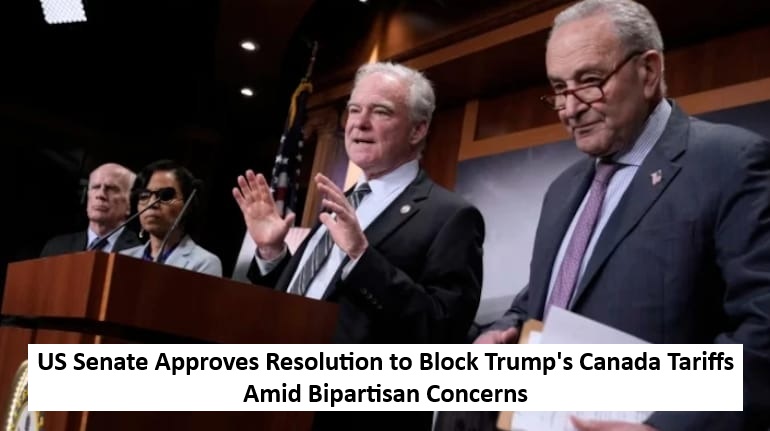
On Wednesday, the US Senate narrowly approved a resolution to block President Donald Trump’s emergency tariffs on Canada. The 51-48 vote signaled bipartisan unease over the economic impact of Trump’s trade actions. Four Republican senators—Rand Paul, Susan Collins, Lisa Murkowski, and Mitch McConnell—sided with Democrats to pass the measure, which seeks to roll back tariffs imposed under the International Economic Emergency Powers Act.
Emergency Justification Under Scrutiny
The resolution targets Trump’s February executive order that cited fentanyl trafficking from Canada as a national security threat to justify a 25% tariff. Lawmakers such as Senator Tim Kaine (Virginia) questioned the legitimacy of the claim, labeling it a “made-up emergency.” Customs and Border Protection data supports these criticisms, showing just 19 kilograms of fentanyl were intercepted at the Canadian border in the past year—compared to nearly 9,600 kilograms seized along the southern border with Mexico.
Republican Senators Break Ranks
Several Republican senators expressed concerns about the tariffs’ economic consequences. Senator Rand Paul called them “a terrible mistake,” warning of higher prices for American consumers. Senator Susan Collins cautioned that the tariffs would damage Maine’s lobster industry. However, Senate Majority Leader John Thune defended the move, citing growing fentanyl production in Canada as justification for decisive action.
Trump Pressures GOP Amid Vote
Ahead of the vote, President Trump publicly urged Republicans to reject the resolution, using social media to criticize the four GOP senators who supported it. He accused them of siding with “Radical Left Democrats and Drug Cartels.”
Despite the pressure, the resolution passed and now heads to the House of Representatives, where Republican leadership is expected to prevent a floor vote.
House Democrats Seek Alternatives
Recognizing the unlikely passage in the GOP-led House, Democrats are preparing alternate approaches. Representative Gregory Meeks announced plans to introduce a privileged resolution aimed at challenging the broader set of tariffs announced by Trump earlier the same day, which target over 100 trading partners.
Growing Resistance to Trade Policy and Executive Power
The Senate’s action reflects increasing bipartisan concern over the administration’s use of executive authority in trade matters. With tensions rising globally due to newly announced tariffs, lawmakers on both sides of the aisle are pushing back against what they view as overreach and economically risky policies.
Read More: Miniskirts in Tehran? The Surprising Truth About Iran Before the Revolution

 Share
Share
_1152292510_100x75.jpg)

_1445939941_100x75.jpg)
